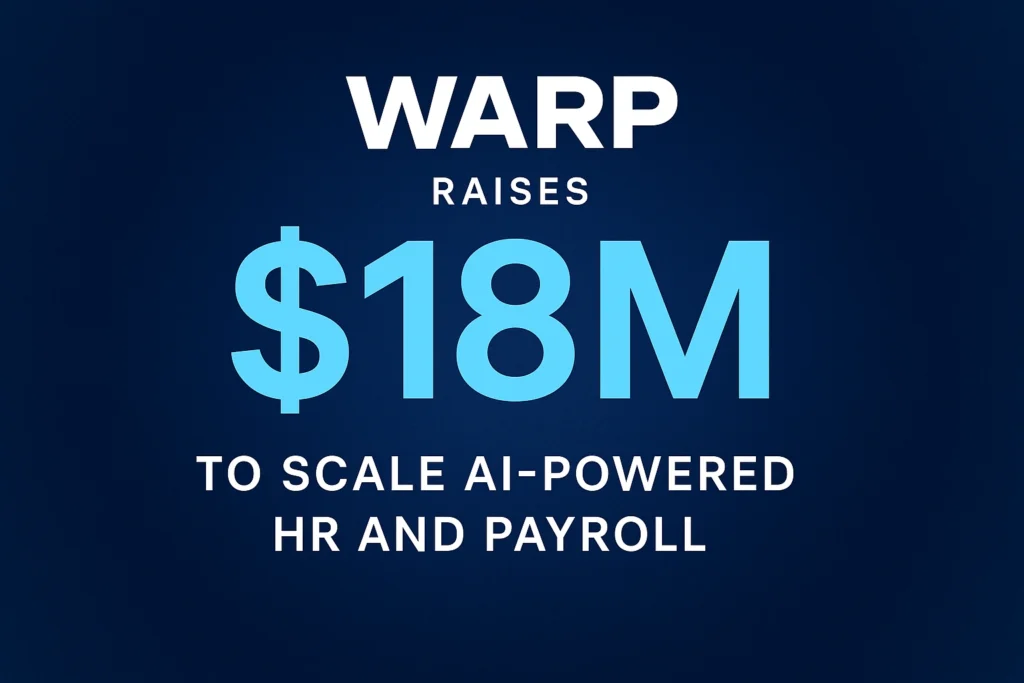On June 18, 2025, something quietly revolutionary happened in the world of HR tech: Warp, a rising AI-first payroll and compliance startup, announced it had closed an $18 million Series A funding round led by Sound Ventures. At first glance, this might seem like just another startup raising capital. But dig a little deeper, and you’ll see why this funding could reshape how early-stage companies handle payroll, onboarding, and the growing headache of multi-state compliance.
Warp was designed from the ground up with a specific mission—to eliminate the manual, error-prone processes that bog down founders and early HR teams. In a time when startups often begin hiring remotely across multiple states from day one, Warp steps in with an AI-native solution that turns hours of paperwork into seconds-long automated flows.
According to the company, this latest round brings Warp’s total funding to $24 million, with the new capital aimed at accelerating product development, scaling customer support, and deepening integrations with other startup tools.
The funding round wasn’t just a financial milestone—it was a vote of confidence from some of the most respected names in tech. Sound Ventures, the investment firm co-founded by Ashton Kutcher and Guy Oseary, led the round. Also participating were Y Combinator, SV Angel, HOF Capital, Homebrew, and a roster of notable angel investors including Dropbox co-founders Drew Houston and Arash Ferdowsi, Cruise founder Kyle Vogt, and operators from Brex and OpenAI.
But what exactly makes Warp different from traditional payroll providers like Gusto, ADP, or Rippling?
At its core, Warp is AI-native—meaning automation isn’t bolted on as an afterthought. The platform is powered by intelligent agents capable of handling end-to-end HR workflows, from registering for state unemployment insurance to managing new-hire paperwork, tax compliance, and benefits enrollment. Warp’s systems don’t rely on a large operations team behind the curtain. In fact, the company says it currently services over 380 startups with the help of just one part-time contractor. That’s not a typo.
Founders using Warp have reported 10× faster filing times, 80% fewer errors, and 90% lower operational costs compared to legacy platforms. These aren’t just nice-to-have metrics—they’re game-changing, especially for small teams with limited resources.
The idea came to life when Ayush Sharma (CEO) and Adam Rankin (CTO), both ex-YC founders, saw how painful back-office operations were for early-stage startups. Hiring employees in multiple states often meant registering for each state’s tax accounts, filing confusing paperwork, and risking penalties from minor errors. Legacy platforms didn’t handle these scenarios well. Warp’s AI agents, trained on these workflows, now handle such tasks almost instantly.
To put this into perspective: a founder hiring someone in Colorado, for example, might need to file forms with multiple state agencies—unemployment, revenue, workers’ comp, and more. Traditionally, this process can take hours or even days, especially if you’re unfamiliar with the state’s specific requirements. Warp compresses that entire sequence into under 30 seconds, thanks to its automation engine.
Beyond the tech, Warp’s customer stories reflect a real shift in what startups expect from HR software. One early-stage fintech, for instance, reportedly onboarded a new team across four states in a single afternoon using Warp—a process that would have previously taken days and required a dedicated operations hire.
What’s also striking is Warp’s scalability. Most HR platforms need to expand customer service and compliance teams to support more clients. Warp claims it can scale indefinitely without growing its headcount, because its AI does the heavy lifting. That’s a bold claim, but the backing from YC and Sound Ventures suggests industry insiders believe in it.
With the new capital, Warp plans to roll out even more features: deeper analytics, intelligent alerts for compliance changes, smarter benefits configuration, and integrations with common startup tools like ATS platforms, accounting software, and cap table managers.
The bigger picture here isn’t just that a startup raised money. It’s that Warp is reimagining the infrastructure of startup HR—a space often overlooked but essential for growth. As remote hiring becomes the norm and compliance risks grow with every new state added to a company’s headcount, tools like Warp aren’t just nice-to-have—they’re becoming a necessity.
For now, Warp is focused on early-stage startups, but the technology it’s building could soon scale up to serve larger businesses. If it does, we may look back at this funding round as the moment AI finally took over the most boring—and critical—parts of running a business.
Warp isn’t just another HR platform with automation tacked on. It’s built with AI at the center, ready to make payroll and compliance as effortless as sending a Slack message. And with $18 million more in the bank, it’s full steam ahead.
